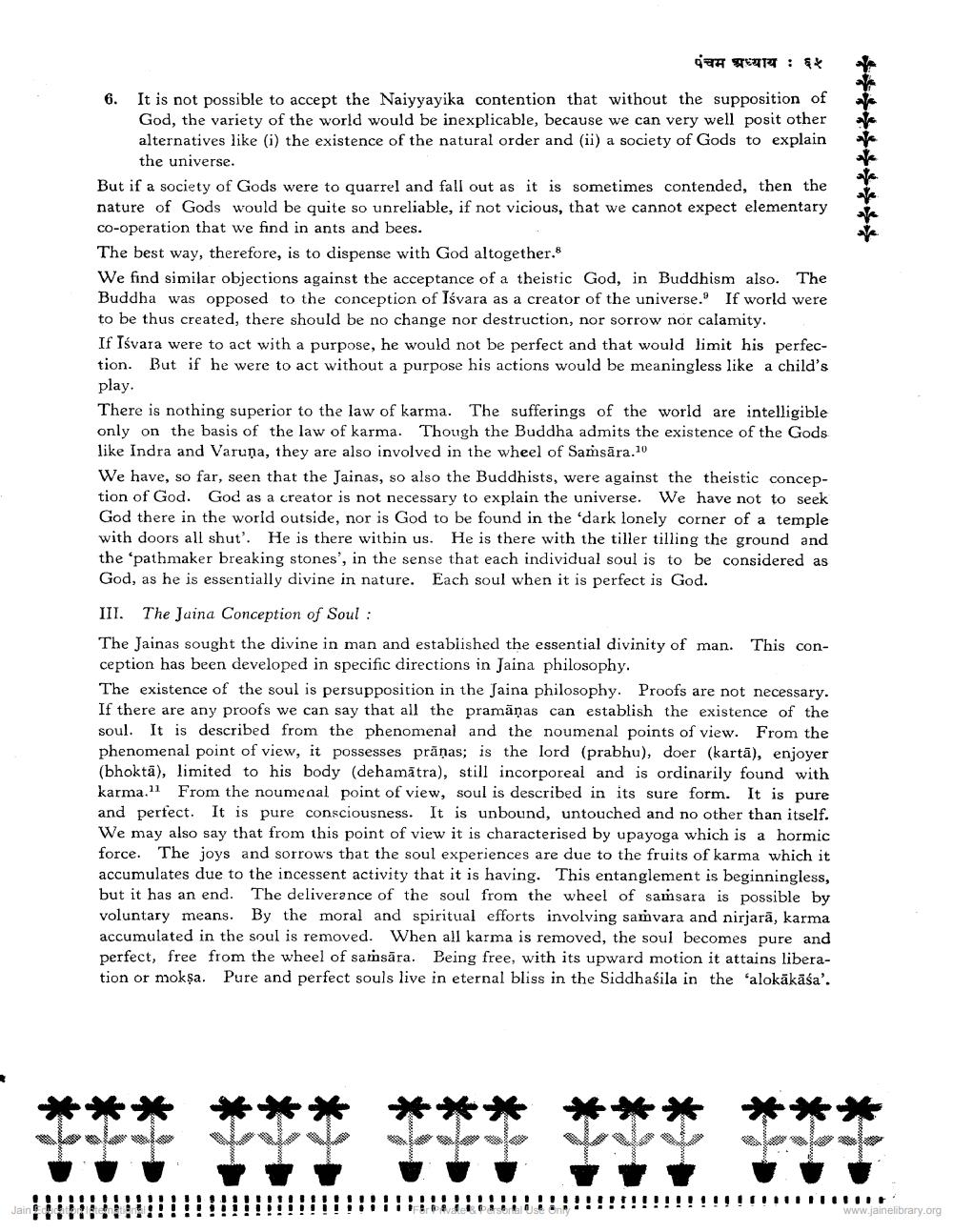________________
पंचम अध्याय : ६५
6. It is not possible to accept the Naiyyayika contention that without the supposition of
God, the variety of the world would be inexplicable, because we can very well posit other alternatives like (i) the existence of the natural order and (ii) a society of Gods to explain
the universe. But if a society of Gods were to quarrel and fall out as it is sometimes contended, then the nature of Gods would be quite so unreliable, if not vicious, that we cannot expect elementary co-operation that we find in ants and bees. The best way, therefore, is to dispense with God altogether. We find similar objections against the acceptance of a theistic God, in Buddhism also. The Buddha was opposed to the conception of lśvara as a creator of the universe. If world were to be thus created, there should be no change nor destruction, nor sorrow nor calamity. If Isvara were to act with a purpose, he would not be perfect and that would limit his perfection. But if he were to act without a purpose his actions would be meaningless like a child's play. There is nothing superior to the law of karma. The sufferings of the world are intelligible only on the basis of the law of karma. Though the Buddha admits the existence of the Gods like Indra and Varuna, they are also involved in the wheel of Samsāra.10 We have, so far, seen that the Jainas, so also the Buddhists, were against the theistic conception of God. God as a creator is not necessary to explain the universe. We have not to seek God there in the world outside, nor is God to be found in the dark lonely corner of a temple with doors all shut'. He is there within us. He is there with the tiller tilling the ground and the 'pathmaker breaking stones', in the sense that each individual soul is to be considered as God, as he is essentially divine in nature. Each soul when it is perfect is God. III. The Juina Conception of Soul : The Jainas sought the divine in man and established the essential divinity of man. This conception has been developed in specific directions in Jaina philosophy. The existence of the soul is persupposition in the Jaina philosophy. Proofs are not necessary. If there are any proofs we can say that all the pramäņas can establish the existence of the soul. It is described from the phenomenal and the noumenal points of view. From the phenomenal point of view, it possesses prāņas; is the lord (prabhu), doer (kartā), enjoyer (bhoktā), limited to his body (dehamātra), still incorporeal and is ordinarily found with karma 11 From the noumenal point of view, soul is described in its sure form. It is pure and perfect. It is pure consciousness. It is unbound, untouched and no other than itself. We may also say that from this point of view it is characterised by upayoga which is a hormic force. The joys and sorrow's that the soul experiences are due to the fruits of karma which it accumulates due to the incessent activity that it is having. This entanglement is beginningless, but it has an end. The deliverance of the soul from the wheel of samsara is possible by voluntary means. By the moral and spiritual efforts involving samvara and nirjarā, karma accumulated in the soul is removed. When all karma is removed, the soul becomes pure and perfect, free from the wheel of samsāra. Being free, with its upward motion it attains liberation or mokşa. Pure and perfect souls live in eternal bliss in the Siddhasila in the 'alokākāśa'.
.
.
III. BLES TI
11IIIIIIIIII iiiiiiiiii
! ! ! !!!!
!!!!!!!!!!!!!!!!!!!!!!!!!!!!!!!!!!!!!!!!111 II iiiiiii
ii
Jain
I . www.jainelibrary.org
FO




